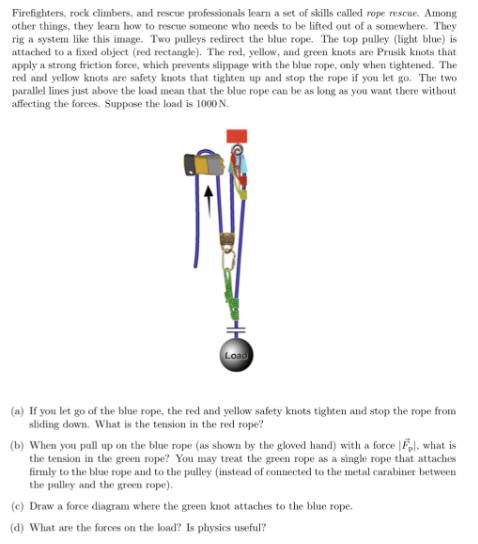Answered step by step
Verified Expert Solution
Question
1 Approved Answer
Firefighters, rock climbers, and rescue professionals learn a set of skills called rope rescue. Among other things, they learn how to rescue someone who

Firefighters, rock climbers, and rescue professionals learn a set of skills called rope rescue. Among other things, they learn how to rescue someone who needs to be lifted out of a somewhere. They rig a system like this image. Two pulleys redirect the blue rope. The top pulley (light blue) is attached to a fixed object (red rectangle). The red, yellow, and green knots are Prusik knots that apply a strong friction force, which prevents slippage with the blue rope, only when tightened. The red and yellow knots are safety knots that tighten up and stop the rope if you let go. The two parallel lines just above the load mean that the blue rope can be as long as you want there without affecting the forces. Suppose the load is 1000 N. (a) If you let go of the blue rope, the red and yellow safety knots tighten and stop the rope from sliding down. What is the tension in the red rope? (b) When you pull up on the blue rope (as shown by the gloved hand) with a force Fl, what is the tension in the green rope? You may treat the green rope as a single rope that attaches firmly to the blue rope and to the pulley (instead of connected to the metal carabiner between the pulley and the green rope). (c) Draw a force diagram where the green knot attaches to the blue rope. (d) What are the forces on the load? Is physics useful?
Step by Step Solution
There are 3 Steps involved in it
Step: 1

Get Instant Access to Expert-Tailored Solutions
See step-by-step solutions with expert insights and AI powered tools for academic success
Step: 2

Step: 3

Ace Your Homework with AI
Get the answers you need in no time with our AI-driven, step-by-step assistance
Get Started


